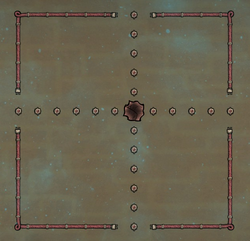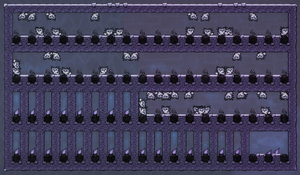Pip
Pip is a critter added in the Launch Update. Pips eat growing branches straight off the Arbor Tree or growing Thimble Reeds and excrete Dirt. Juvenile Pips are called Pipsqueaks.
Behavior
Pips plant seeds in natural tiles with a Hardness rating under 150. They plant Waterweed seeds only if the materials have salt water above. They do not appear to plant other seeds in materials with salt water. They don't plant a seed in a target tile if there are already 3 or more Plants within an area: 5 up, 5 to the right, 6 down and 6 to the left from the tile. For hanging plants, such as Dasha Saltvine and Pincha Pepperplant, this bounding box is flipped vertically.
Pips only carry seeds for about 30 tiles - if there is no tile eligible within this distance, they will leave seeds where they are. They are capable of planting in Farm Tiles, which will also domesticate the plant.
They are able to cling strongly to any surface, and will freely wander the full perimeter of whatever chamber they are in. They are not hostile and are quite mobile, inevitably wandering away from any chamber they are not trapped in. They also seed hanging plants from the underside.
Occasionally, Pips navigate to storage containers and knock a debris type out of it, when piles amount for more than 1kg / 1 whole seed.
They also rummage through Arbor Trees and extract Arbor Acorns from branches that contain acorns (each new branch has 5% chance of containing one).
Another annoyance can be provided if they wander into empty farm plots, since they will plant seeds there too.
Variants
The Pip comes in two variants (as of the Fast Friends update). While their diet is the same, the Cuddle Pip variant can only be obtained by feeding pips Thimble Reed and they consume 20% more food than their regular counterparts, but they can cuddle eggs and only requires 4 tiles of space per cuddle pip when calculating overcrowding. This allows 3 times as many cuddle pips to be ranched as the regular pips in the same size ranch. Cuddle pips also consider all eggs to only require 4 tiles of space regardless of the egg type (allowing for them to be ranched in a large incubator room without becoming crowded).
Pip
Cuddle Pip
A Pip fed primarily Thimble Reed will have a chance of producing a Cuddle Pip Egg, with a larger chance given a higher volume of Thimble Reed consumed. The Cuddle Pip shares the same behavior of the Pip, but it can cuddle eggs and hug duplicants.
Cuddling and Hugging
Twice a cycle, cuddle pips will search for an egg they can reach to try and cuddle it. Successful cuddles increase the hatching rate of the egg by 5% per cycle stacking with the incubator's lullabied buff. This buff cannot be stacked with itself, so the ideal scenario is to have twice as many eggs as cuddle pips in the room.
Twice per cycle (unless already successfully hugged), cuddle pips will stand up and look for hugs from passing duplicants for 30 seconds. If a duplicant hugs a cuddle pip, the pip will then try to cuddle every egg in the room for the next cycle. The hug will also provide the duplicant with a buff which provides -5% stress per cycle for half a cycle.
Note: Duplicants will not seek out pips to hug them. They will only hug a pip if they happen to pass by during the 30 second hug window.
Building farms
It is possible to use their ability to plant plants in natural tiles to build farms that require no resources. It is possible to make a farm of plants planted on every other block horizontally and every 5 blocks vertically by forcing the Pips to plant from the top right going left and doing the rows from the top down. Hanging plants should instead be started from the bottom right, then left and moving up.
Pips will not plant a seed where the building is planned for construction. You can use it by placing e.g. ladders everywhere, with priority 1, and then cancelling construction - almost immediately Pip will carry a seed to that location (assuming all other conditions are met).
There is a bug where two plants can be planted in the same spot, which prevents Pips from planting where it looks like they should.
1-Space or 3-Space
Plants can either be planted in groups of 3, with 3 tiles between groups, or just 1 space between each plant. Creating a table to sum up the total amount of plants in a horizontal space of a given amount of tiles will show two scenarios. In the first, using 3 spaces between groups of 3 plants will be more space efficient, and in the second scenario, the two methods will be equal in efficiency.
| Tiles | Total plants for 1-space | Total plants for 3-space |
|---|---|---|
| 1 | 1 | 1 |
| 2 | 1 | 2 |
| 3 | 2 | 3 |
| 4 | 2 | 3 |
| 5 | 3 | 3 |
| 6 | 3 | 3 |
This pattern repeats for every 6 tiles, which then makes the most efficient use of space for pip-planting being . (3, 9, 15 ... )
Creating natural tiles
- Shove Voles eat Iron, Regolith, Dirt, and then excrete natural tiles accordingly. Tiles placement and vole management may be tedious.
- Heating up 5 kg piles of Fertilizer, Algae or Slime on the floor above 125 °C will turn them into dirt tiles.
- Manual Airlock can be surrounded by 9 tiles, with free tile above. Destroying manual airlock will turn it into tile of respective ore.
- Liquid Phosphorus and Sulfur can be delivered via Pitcher Pump and Bottle Emptiers, and cooled down. They will turn into natural tiles if their mass is enough (strictly above 160 kg and 400 kg respectively).
- Molten Glass can be pumped into a Hydroponic Farm that, when deconstructed, will yield a glass natural tile if its surroundings are cool enough.
- For planting Sleet Wheat and other cold-tolerant plants, water can be poured into place and then Frozen into natural Ice tiles. Mostly useful on Rime
 Cooling down 1473 kg of Nuclear Waste below 23.9 °C will form a tile. Since Nuclear Waste normally only fills a cell up to 1000kg, this requires compressing an additional 473kg into the cell . One way to do this is by diagonally building an Airflow Tile to force 2 cells of Nuclear Waste to merge. Nuclear waste tiles emit radiation, making it ideal for Plant Mutations.
Cooling down 1473 kg of Nuclear Waste below 23.9 °C will form a tile. Since Nuclear Waste normally only fills a cell up to 1000kg, this requires compressing an additional 473kg into the cell . One way to do this is by diagonally building an Airflow Tile to force 2 cells of Nuclear Waste to merge. Nuclear waste tiles emit radiation, making it ideal for Plant Mutations.
Dense Arbor Tree Farm
Pips' nimble paws allow them to plant seeds in Farm Tiles between Arbor Trees that Duplicants can't. A space efficient farm can be built by dispensing seeds and a pip in an enclosed room with farm tile floor. Eventually, all tiles will be planted by the pip. The same trick applies to a Farm Tile adjacent to other buildings as well, as long as the 3 tiles space above it is not obstructed.
Regular Pip Ranching
(The following only applies to regular pips)
Pips require 0.325 wild or 0.09 domestic Arbor Trees per Pip to stay fed. A maximum size ranch can be supported by 3 wild or 1 domestic Arbor Tree.
Pip eggs can be cracked to produce 1kg of Raw Egg which can be cooked into 2800kcal of Omelette. Alternatively the egg can be hatched and the pip killed to produce 1kg of Meat which can be cooked into 2000kcal of Barbeque.
If never crowded and always groomed, a pip will produce 15 eggs during its 100 cycle lifespan. Cooking the eggs (leaving one to replace the pip) and final meat would yield a total of 41200kcal or 412kcal/cycle over the pip's lifetime. This puts a lower limit of ~2.427 pips to feed one duplicant on default difficulty.
Pips can process wild Arbor Trees into free dirt. One Pip can supply 2 Mealwood plants or domestic Arbor Trees, 4 Nosh Sprouts or Sleet Wheat plants, or 5 Oxyferns. A shared ranch with seven Pips and a single Sage Hatch can act as a low-maintenance source of Coal. Two Pips can keep a Fertilizer Synthesizer running constantly (with some dirt left over). A single Pip ranch can supply 16 Mealwood, which will feed 16 Glossy Dreckos, or exactly enough for two full Drecko ranches.
Pips can rummage through Arbor Tree branches for Arbor Acorns - this is the only way to acquire additional acorns. They can reach all branches from the base of the arbor tree.
Cuddle Pip Ranching
Converting ranches from regular pips to cuddle pips MAY be an effective means to increase both dirt and food production. It is important to note that this relies on the ability to fit additional cuddle pips in each ranch compared to regular pips. Each cuddle pip produces the same egg and meat output as a regular pip, but only produces 5/8 (.625) the amount of dirt. The logical conclusion is that any ranch that can support additional pips can convert to cuddle to increase the food output, but cuddle ranches need at least 13 (12.8) happy cuddle pips to match the dirt output of 8 regular pips.
Cuddle pips require 0.397 wild or 0.098 domestic Arbor Tree per Pip to stay fed (assuming 5 branches per tree). A maximum size ranch can be supported by 9.5 wild or 3 domestic Arbor Trees.
| Regular Pips | Cuddle Pips | Ratio | |
|---|---|---|---|
| Max Per Stable | 8 | 24 | 1 : 3 |
| Branches Eaten
Per Day |
1.625 | 1.98 | 1 : 1.2 |
| Dirt Produced Per Pip | 20kg | 12.5kg | 1 : 0.625 |
Bugs
- Pips can plant in entombed Flower Pots, which results on tame plants that don't need solid fertilizer to grow.
- Pips can plant several seeds on the same tile when manipulated to do so.
Trivia
- Wild, happy Pips lay their eggs when they are 65 cycles old.
- Pips are called Squirrels in game files.
- Pipsqueaks can be printed from the printing pod after cycle 24
Links
- Pip Planting: Everything You Need to Know on Klei forums.
History
- U42-509629: Added Cuddle Pip critter morph








